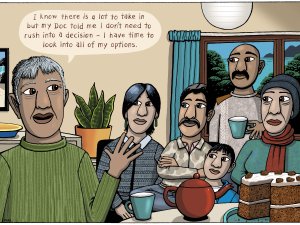Prostate cancer consultations are common in primary care and there is no one approach to testing and treatment that fits all patients. Urologist Simon van Rij discusses the key considerations and options for personalised care, appropriate investigation and treatment
Cannabis-based medicines for cancer pain management
Vault Navigation
Cannabis-based medicines for cancer pain management
How safe and effective are cannabis-based medicines, including medical cannabis, for treating pain and other symptoms in adults with cancer?
Nabiximols and tetrahydrocannabinol (THC) did not differ from placebo in reducing pain, sleep problems, and opioid maintenance and breakthrough dosages. There was no clinically relevant benefit of nabiximols for the number of participants who reported they were much or very much improved (number needed to treat for an additional beneficial outcome = 16; 95% confidence interval 6–100).
There was no difference between nabiximols and THC versus placebo with regard to the dropout rates due to adverse events and the frequency of psychiatric disorders as adverse events. There was clinically relevant harm by nabiximols and THC in the frequency of nervous system adverse events compared with placebo (number needed to treat for an additional harmful outcome = 9; 95% CI 6–20).
This review found that nabilone did not reduce pain associated with chemotherapy or radiochemotherapy in people with head and neck cancer or non-small cell lung cancer.
This review also found that synthetic THC analogue was superior to placebo and not superior to codeine in reducing moderate to severe cancer pain after cessation of previous analgesic treatment for 3 to 4.5 hours.
When nabiximols are administered oromucosally, plasma levels of THC and other cannabinoids are lower than the levels achieved following inhalation of cannabinoids at a similar dose. Insufficient plasma concentrations of nabiximols might be a potential cause of therapeutic failure in some participants of the studies analysed.
Pain is a common symptom in people with cancer – 30 to 50% of people with cancer will experience moderate to severe pain. This can have a major negative impact on their quality of life. Opioid (morphine-like) medications are commonly used to treat moderate or severe cancer pain, and are recommended for this purpose in the WHO analgesic ladder for cancer pain.
However, pain is not sufficiently relieved by opioid medications in 10 to 15% of people with cancer. In people with insufficient relief of cancer pain, new analgesics are needed to effectively and safely supplement or replace opioids.
Häuser W, et al. Cannabis-based medicines and medical cannabis for adults with cancer pain. Cochrane Database Syst Rev 2023;6:CD014915. This review contains 14 trials with a total of 1823 participants.




